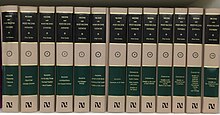Our website is made possible by displaying online advertisements to our visitors.
Please consider supporting us by disabling your ad blocker.
Sacred tradition

Sacred tradition, also called holy tradition or apostolic tradition, is a theological term used in Christian theology. According to this theological position, sacred Tradition and Scripture form one deposit, so sacred Tradition is a foundation of the doctrinal and spiritual authority of Christianity and of the Bible. Thus, the Bible must be interpreted within the context of sacred Tradition (and vice versa) and within the community of the denomination. The denominations that ascribe to this position are the Catholic, Eastern Orthodox, and Oriental Orthodox churches, and the Assyrian churches (the Ancient Church of the East and the Assyrian Church of the East).
The Anglican and Methodist churches regard tradition, reason, and experience as sources of authority but as subordinate to scripture – a position known as prima scriptura.[1][2] That is in contrast to the Lutheran and Reformed traditions, which teach that the Bible alone is a sufficient/infallible basis for all Christian teaching – a position known as sola scriptura.[3]
For many denominations of Christianity, the writings of the Ante-Nicene Fathers, Nicene Fathers and Post-Nicene Fathers are included in sacred Tradition.[4]
- ^ "Wesleyan Quadrilateral: Tradition". Free Methodist Church of Santa Barbara. Retrieved 30 June 2021.
In the Free Methodist Church, we believe all truth is God's truth. If something is true, we embrace it as from the Lord. First and foremost, we hold scripture up to be the primary source of God's inspired revealed truth to us. And, we also embrace truth that is found in three other places: reason, tradition, and experience. Along with scripture, this has come to be called the Wesleyan Quadrilateral and we believe it informs our theology.
- ^ Winright, Tobias (10 December 2020). T&T Clark Handbook of Christian Ethics. Bloomsbury Publishing. ISBN 978-0-567-67718-1.
Both the Anglican and United Methodist Churches affirm tradition as a "source of authority." The Anglican Church incorporates it as part of its "three-legged stool," and Methodists as the Wesleyan Quadrilateral of scripture, reason, tradition and experience.
- ^ Cite error: The named reference
WELS2014was invoked but never defined (see the help page). - ^ Plekon, Michael (2003). Tradition Alive: On the Church and the Christian Life in Our Time : Readings from the Eastern Church. Rowman & Littlefield. p. 70. ISBN 978-0-7425-3163-5.
Previous Page Next Page


